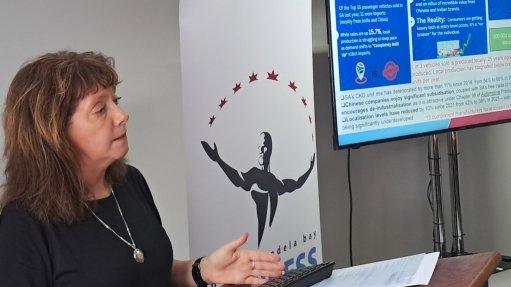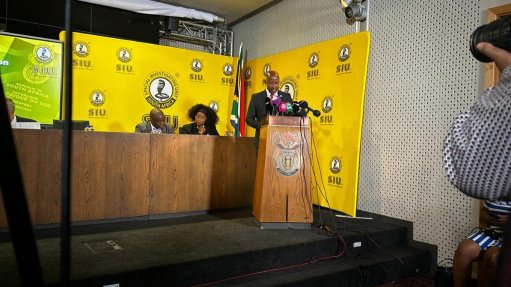China’s participation key to AfCFTA success
South African diplomat and ambassador of South Africa to Madagascar Gert Grobler has emphasised the importance of the African Continental Free Trade Area (AfCFTA) in advancing Africa’s integration and development, as well as the vital role that China can play in advancing progress with the AfCFTA through cooperation and development.
“Despite headwinds, trade between Africa and China jumped to a record of $260-billion in 2022 and continues to grow. This is owing to Beijing’s recent push to boost imports from Africa, with 11% year-on-year growth,” Grobler noted during a webinar, titled ‘The Future of Africa-China Trade and How to Get There’, hosted by the South African Institute of International Affairs (SAIIA) on July 12.
“AfCFTA represents a comprehensive plan that seeks to create a single, liberalised market for goods, services and capital in a 55-nation bloc of 1.3-billion people, with $3-trillion combined gross domestic product. The AfCFTA is also aimed at enhancing intra-regional trade, as well as industrial and infrastructure development.”
Grober added that, in supporting Africa to advance integrated cooperation, China had agreed to actively participate in the development of the AfCFTA, and provide continued support to the AfCFTA secretariat towards the full integration of this trade initiative.
With the establishment of the AfCFTA, and increasing involvement of Chinese firms, China and Africa are both set to benefit by using the AfCFTA to boost African exports to China.
WHAT IS NEEDED FROM AFRICA
To fully implement and benefit from the AfCFTA, Grober stressed that African countries would need to implement a number of measures to ease the implementation of the associated trade agreement, which China could assist with.
The first measure would be to encourage progressive liberalisation of cross-border trade and investment policies, in line with the AfCFTA protocols to establish the groundwork for regional value chains in Africa.
“African countries also need to streamline customs and border procedures. This comes in addition to upgrading infrastructure to reduce long delays at borders, which have slowed the movement of goods and raised trade costs, as well as developing effective logistics hubs.”
Grobler pointed out that African countries also needed to strengthen cross-border trade and investment in services, by facilitating trade in digital services, removing foreign direct investment restrictions, and liberalising the movement of workers.
Grobler further noted that Africa, which continued to face major economic and development challenges, currently had high expectations for Africa-China cooperation to boost economic recovery, and was eager to expand cooperation regarding value-added exports to China.
“China has noted these African concerns and, consequently, announced a series of practical and results-based measures, which would further facilitate trade. China is taking active measures to encourage imports from Africa, especially non-resource products.
"Working towards balanced growth of bilateral trade, China has put forward a number of practical initiatives which are currently, and jointly, being implemented.”
CHINA PROGRAMMES
Grober stated that China had committed to establishing a pioneering zone for in-depth China-Africa trade and economic cooperation, as well as a China-Africa industrial park to advance cooperation on China's industrial strategy “Belt and Road”.
China will also launch a trade promotion programme by providing $10-billion of trade finance to support African exports.
“China will support Africa in increasing export capacity by strengthening cooperation with African countries on inspection and quarantine of agricultural produce and food, accelerate quarantine processes, and import more value-added African products.”
He also pointed out that China was working towards balanced growth of bilateral trade, and would aim to reach $300-billion in total imports from Africa over the next three years by opening “green lanes” for African agricultural exports to China.
He also noted that, by increasing the amount of products that can be exported to China tariff-free, a growing number of African countries were already exporting more than 90% of their products to China tariff-free.
Grobler also stated that the third China Africa Economic Trade Expo, which was held in Changsha, in China, from June 29 to July 2, was a “commendable initiative”. The event presented concrete evidence of China's unwavering commitment to actively expand its economic relations with Africa and open markets.
“This is the biggest platform for economic and trade cooperation under the framework of the Forum of China-Africa Cooperation”.
He said about 120 projects were signed, amounting to about $10-billion.
Grobler also noted that, in November 2021, in Dakar, Senegal, China undertook to invest a further $60-billion in Africa by 2035. This was done particularly in support of African agriculture, manufacturing, infrastructure, environmental protection, the digital economy, and the blue economy.
China also encouraged its businesses to invest no less than $10-billion in Africa over the next three years, and will establish a platform for China-Africa private investment promotion to facilitate this.
“Last week, in Changsha, the China Africa Trade Index was released. Compared with a base reading of 100, reported in 2000, the index rose to 990.55 in 2022, showing that bilateral trade remains on a rapid upwards growth trajectory and is likely to continue to scale new heights”.
AN EMPOWERED AFRICA
Grober stressed that, for future Africa-China cooperation, it was vital that projects based on Chinese financing and support needed to be increasingly linked to “concrete benefits for Africans”.
These benefits should be focused on concerns for, and the enhancement of, local labour, local procurement, the environment and other similar factors.
“It is critical for Africa to demonstrate to its people that it has the ability to pursue its own preferred home-grown development, and hence cooperate with China and other international partners in a manner that increasingly enhances Africa's key priorities.
"What is also important for Africa's interaction with China, and Africa’s interaction with all international partners, is that it is in Africa's own interest to ensure and demonstrate that it is optimally positioned in order to maximise the benefits and gains from the opportunities offered by China and other international partners.”
He added that, in recent years, greater effort had been noted by the African Union (AU) on Africa exercising agency and ownership in pursuing development efforts.
“These efforts, which were captured by the AU Agenda 2063 documents and other documents on institutional and capacity building reform, remain highly relevant and of great importance to create strong African institutions to deal with international partners.”
To support this endeavour, Grobler said that Africa would have to increasingly approach China – and all international partners – in a more empowered, coordinated, collective and strategic manner.
“I concur with SAIIA’s broad-based approach that based on current African-China relations over the last few decades, this relationship will continue to expand in scope and strength.
“China and Africa are standing at a new historical juncture in further consolidating, promoting and embracing broader and more strategic economic cooperation at an increasingly higher level,” he concluded.
Article Enquiry
Email Article
Save Article
Feedback
To advertise email advertising@creamermedia.co.za or click here
Press Office
Announcements
What's On
Subscribe to improve your user experience...
Option 1 (equivalent of R125 a month):
Receive a weekly copy of Creamer Media's Engineering News & Mining Weekly magazine
(print copy for those in South Africa and e-magazine for those outside of South Africa)
Receive daily email newsletters
Access to full search results
Access archive of magazine back copies
Access to Projects in Progress
Access to ONE Research Report of your choice in PDF format
Option 2 (equivalent of R375 a month):
All benefits from Option 1
PLUS
Access to Creamer Media's Research Channel Africa for ALL Research Reports, in PDF format, on various industrial and mining sectors
including Electricity; Water; Energy Transition; Hydrogen; Roads, Rail and Ports; Coal; Gold; Platinum; Battery Metals; etc.
Already a subscriber?
Forgotten your password?
Receive weekly copy of Creamer Media's Engineering News & Mining Weekly magazine (print copy for those in South Africa and e-magazine for those outside of South Africa)
➕
Recieve daily email newsletters
➕
Access to full search results
➕
Access archive of magazine back copies
➕
Access to Projects in Progress
➕
Access to ONE Research Report of your choice in PDF format
RESEARCH CHANNEL AFRICA
R4500 (equivalent of R375 a month)
SUBSCRIBEAll benefits from Option 1
➕
Access to Creamer Media's Research Channel Africa for ALL Research Reports on various industrial and mining sectors, in PDF format, including on:
Electricity
➕
Water
➕
Energy Transition
➕
Hydrogen
➕
Roads, Rail and Ports
➕
Coal
➕
Gold
➕
Platinum
➕
Battery Metals
➕
etc.
Receive all benefits from Option 1 or Option 2 delivered to numerous people at your company
➕
Multiple User names and Passwords for simultaneous log-ins
➕
Intranet integration access to all in your organisation


















